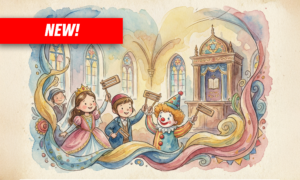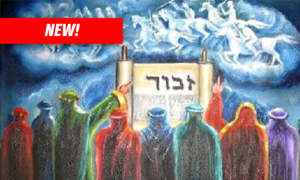A. A Heavenly Argument
When Moses ascended Mount Sinai to receive the Torah, the angels asked that the Torah be given to them (Source 1).
Being that angels cannot relate to the Torah and its physical obligations, asks the Rebbe, what were they demanding? The Rebbe answers that they wished to receive the spiritual dimension of the Torah.
A fascinating tale about Mishnah study in heaven in a spiritual manner (Source 2).
B. How Do You Get Married?
There are three ways of effecting a Jewish legal marriage: With money, a legally binding document, or cohabitation (Source 3). This marriage is called kidushin, or sanctification, and following this the relationship is exclusive (Source 4). Accordingly, there are two elements of a marriage: A. Their sacred and exclusive relationship. B. The three methods of forging a bond between the couple.
C. Marriage with the Creator
Rabbi Akivah taught that King Solomon’s Song of Songs is the holiest of holy writings, because this song is a parable for the relationship between G-d and the Jewish people (Source 5).
Just as marriage is a bond of exclusivity, so too the marriage between G-d and His people is an exclusive one. How is that expressed? One may not gain pleasure from the world without making a blessing. The world’s bounty is G-d’s, and He permits us to enjoy it with certain conditions (Source 6).
(Alternatively: In a mortal marriage, one cannot be married to their spouse and another person simultaneously. The same applies in the spiritual sense, a Jew cannot be wed to G-d and also to the material world. One need not abstain from the material, but remember who they are married to, and what their priorities are.)
Story: Choosing G-d.
The second element is also present in our relationship with G-d. There are three ways to “marry” G-d: (a)cohabitation – mitzvot that are done with one’s body, (b)Money – mitzvot one does with their property, and. (c) a legal document – studying Torah, the most precious of documents.
What’s interesting is that marriage effected by money or a legal document can be done through an agent, however the third method, cohabitation, can obviously be done by the husband alone. This is reflected in the three categories of mitzvot too, mitzvot done by using one’s belongings can often be fulfilled by an agent, however mitzvot done with the body can only be fulfilled by the person themselves.
The takeaway: Although the Torah and mitzvot were given at Sinai thousands of years ago, we must recall that spark and passion today (Source 7). Our passion needs to find expression in both elements: being G-d’s chosen one, to the exclusion of worldly pleasures, and connecting with G-d in all three ways: Bodily mitzvot, Torah study and mitzvot done with our property.






